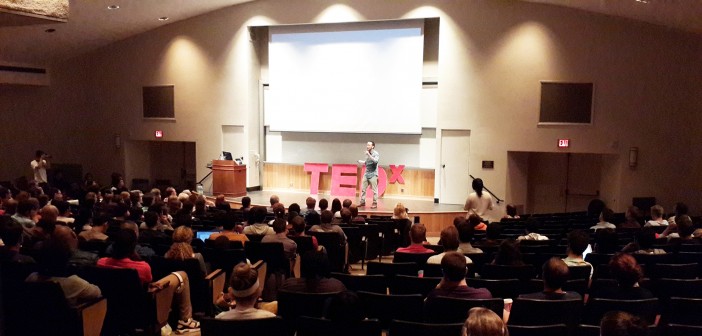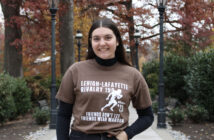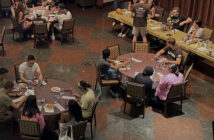Six speakers shared ideas about the future of our society for the annual TEDxLehighU presentation, which took place in Packard 101 on Wednesday evening.
Hosted by Alpha Omega Epsilon and Delta Upsilon, the event drew a crowd so large it was barely able to cram into the seats of the auditorium. Interspersed with video from the TED website, the live lectures adhered to the theme of “The Future of Our Society” and featured topics ranging from social change and communication to creative entrepreneurship and education.
“In college, we get a lot of opportunities to hear all kinds of speakers, but this TED talk was compelling because it focused on something that we’re all thinking about: the future,” Trina Whiteside, ’18, said.
One of the presenters for the event, Professor of Practice Dr. Stephen Garrigan, called TED “one of the most dramatic examples of free sharing of high-quality information on the Web.
“This TEDxLehighU was a great opportunity to look beyond the Lehigh campus to envision the global society to which Lehigh students will soon contribute,” he continued.
Gerardo Calderón, community organizer for the grassroots initiative Campaign for Change in Allentown, was the first speaker to address the room. He began his speech with a cultural analogy between his native country El Salvador and the United States. He explained to the audience that, in El Salvador, the concept of superheroes that is so embedded in American culture does not exist with the same prevalence. Rather, the country possesses the mentality that if they want to see change, they need to get together as a community to achieve their goals rather than wait for a savior of some sort.
Calderón delved deeper into the importance of community-based social change as his speech progressed, and he encouraged his listeners to make connections within their communities if they truly wished to see change.
“You are not a hero, you are better than that. You are real,” he said.
Nick Stephens, ’15, a member of Student Athletes Leading Social Change (SALSC), then delivered a powerful message on the significance of an individual in driving social change at any level. Stephens cited the SALSC motto, “Believe in the future, aspire to change, and no one stands alone” to summarize the way in which social change should be perceived. The athlete reminded attendees how painful it is to feel lonely and left out and encouraged his audience to remember to be socially inclusive.
Stephens questioned listeners about how conscious they were of the strangers sitting around them and said the student body as a whole should not be afraid to reach out and make connections with one another.
In the third talk, Professor of Education Dr. Scott Garrigan spoke about what he described as an “education conundrum.” Garrigan said that, just as people vary in everything from height and weight to hair color and eye color, people differ greatly in the way they process information. He especially emphasized the impracticality of a one-size-fits-all curriculum.
“Lehigh students will enter careers that will require constant learning throughout life,” Garrigan said. “You could make a good case that understanding how you learn best may be a critical skill for continued future success.”
Attendees then listened as consultant and author Shawn Kent Hayashi discussed the changing nature of talent at work. As Lehigh’s executive resident for the MBA program, Hayashi is attuned to the sorts of trends that are affecting the future of the business world.
“The resumé is dead,” Hayashi said. The entrepreneurial coach emphasized the way in which talent in the workplace is increasingly intertwined with technology.
Continuing on with this theme was the next TED presenter, Dr. Michael Lehman, who drew a parallel between The Wizard of Oz and the recipe for entrepreneurial success.
“To understand the innovators of the future,” Lehman said, “we look to the past.” Inviting students to travel down the proverbial yellow brick road with him, Lehman equated Dorothy’s initial landing in Oz to the process of defining of a problem that should take place at the start of every entrepreneur’s development phase.
Concluding the presentation was Dr. Gregory Skutches, who spoke on the psychology of aging. As he opened his presentation, Skutches asked how many members of the audience had been told that the college years would be the best years of their lives. Throughout his talk, the professor encouraged students to discard the negative connotations associated with growing older.
“How old would you be if you didn’t know how old you were?” Skutches asked.
Ralph Hernandez, ’18, said the TED talks put things in perspective on how to lead and make a difference in both your own life and others’ lives.
“Seeing examples of Lehigh students and faculty who took charge and made an impact was very inspiring,” he said.






Comment policy
Comments posted to The Brown and White website are reviewed by a moderator before being approved. Incendiary speech or harassing language, including comments targeted at individuals, may be deemed unacceptable and not published. Spam and other soliciting will also be declined.
The Brown and White also reserves the right to not publish entirely anonymous comments.